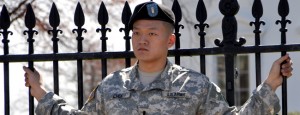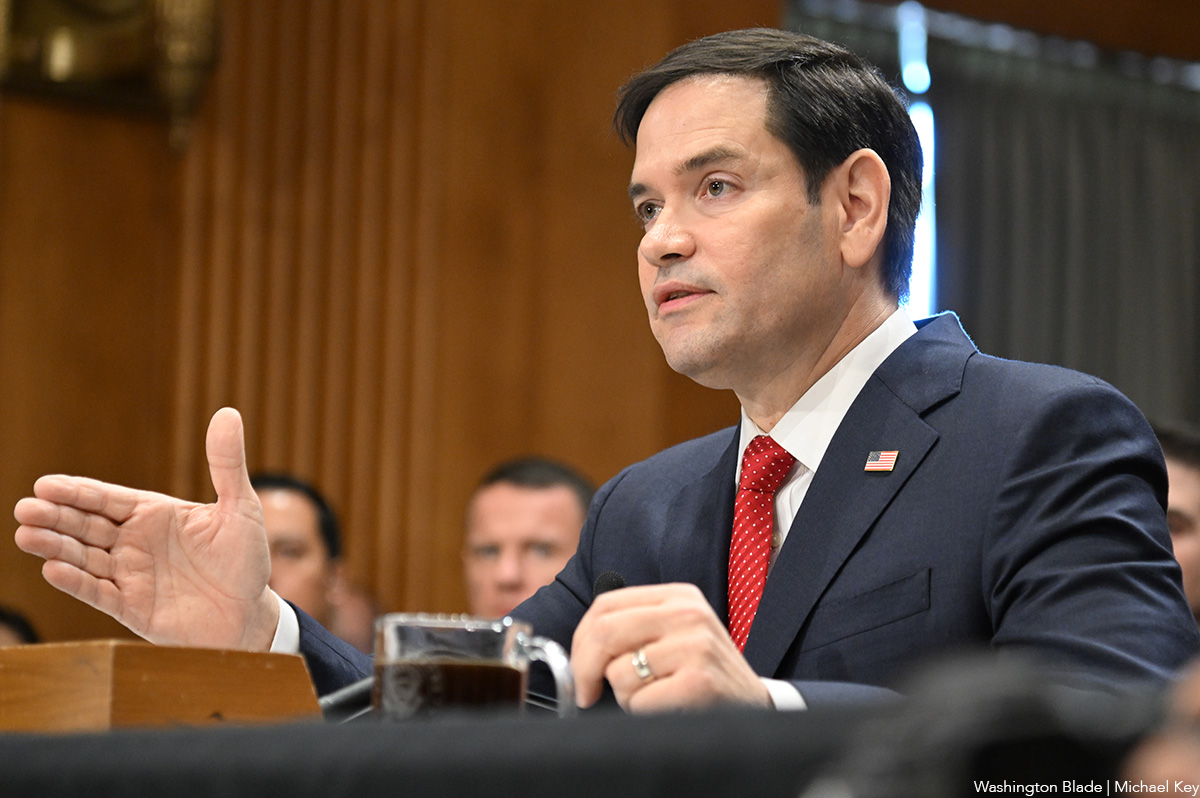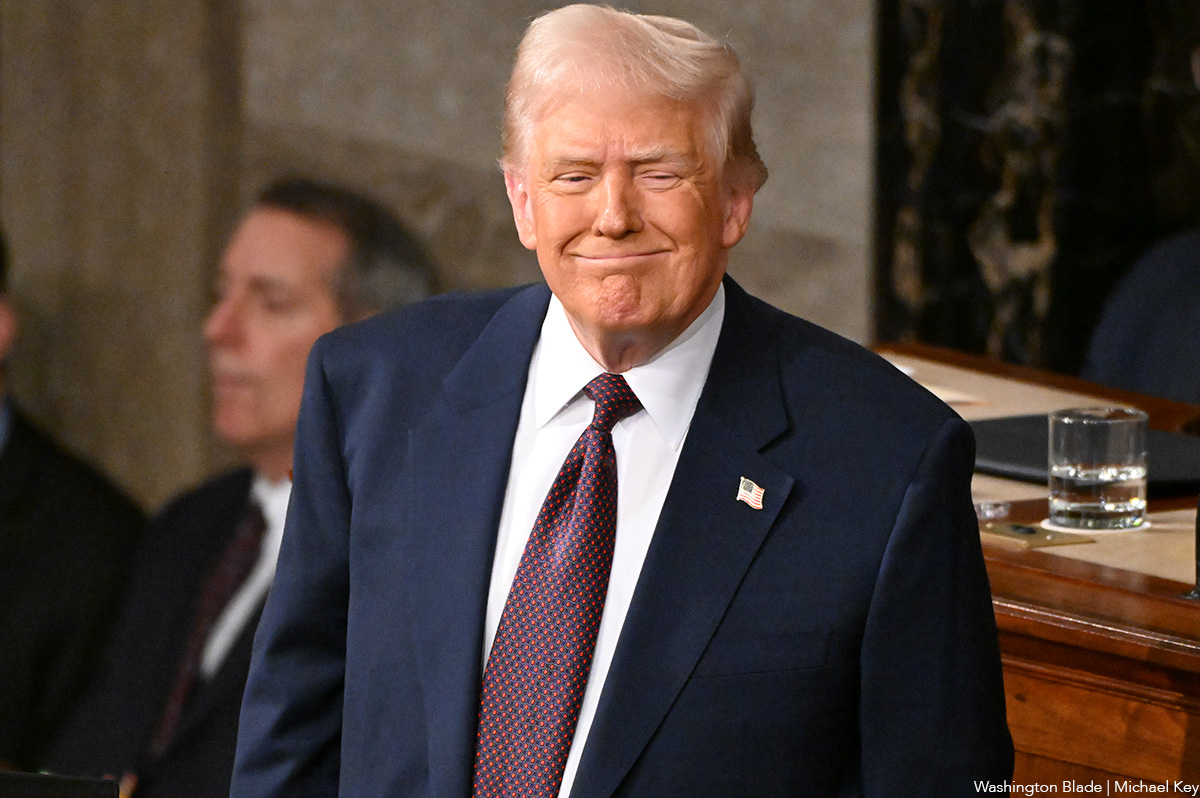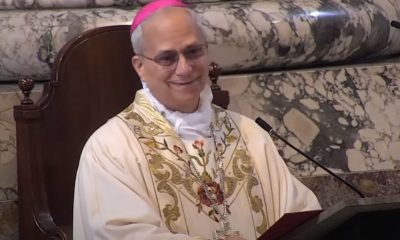National
Will arrests at White House usher new era of activism?
Gay soldier becomes face of civil disobedience

Lt. Dan Choi, a gay West Point graduate and Arabic linguist who served as an infantry officer in Iraq, was arrested last week after handcuffing himself to the White House fence in protest of ‘Don’t Ask, Don’t Tell.’ (DC Agenda photo by Michael Key)
A gay solider who handcuffed himself to the White House fence last week in protest of “Don’t Ask, Don’t Tell” has emerged as a national figure who is challenging LGBT rights groups to take a more militant posture in the fight for anti-discrimination bills stalled in Congress.
Lt. Dan Choi, a West Point graduate and Arabic linguist who served as an infantry officer in Iraq, was one of three protesters arrested outside the White House on March 18. Many people see the action as a challenge to gay groups aligned with the Obama administration and Democratic Party leaders in Congress.
“I want to explain why these actions are exactly what we need to be doing as American citizens,” Choi told DC Agenda upon his release from jail March 19. “When there’s a time when our leaders are unable, unwilling to do the right thing, somebody has to step up to the responsibility.”
His arrest — and comments in a Newsweek interview this week criticizing gay rights leaders for being too closely aligned with the Washington political establishment — comes at a time when some activists and donors are complaining that President Obama and Democratic leaders in Congress have not pushed hard enough to advance several LGBT rights bills, including the repeal of “Don’t Ask, Don’t Tell.”
Choi, who is in the process of being discharged from the Army under “Don’t Ask, Don’t Tell,” was joined in the White House protest by Jim Pietrangelo, a former Army captain discharged in 2004 for being gay, and Robin McGehee, co-founder of the new LGBT direct action group GetEqual.org.
Pietrangelo also handcuffed himself to the fence while McGehee assisted the two. Police charged all three with refusing to obey a lawful order to disperse, a misdemeanor that carries a maximum penalty of a $1,000 fine.
McGehee agreed to pay a $35 fine to end the case against her in a process known as post and forfeit. But Choi and Pietrangelo pleaded not guilty at an arraignment the following day in D.C. Superior Court after being held overnight in jail. A judge set an April 26 trial date for the two.
Shortly after U.S. Park Police officers arrested Choi and Pietrangelo and uniformed Secret Service officers arrested McGehee, four other protesters affiliated with GetEqual.org were arrested by U.S. Capitol police for staging a sit-in at the Capitol Hill office of House Speaker Nancy Pelosi (D-Calif.).
Other people were arrested around the same time in Pelosi’s district office in San Francisco. The Washington and San Francisco protesters said they were targeting Pelosi for not moving fast enough to schedule a House vote on the Employment Non-Discrimination Act, or ENDA. The long-stalled legislation calls for banning employment discrimination on the basis of sexual orientation and gender identity.
“We had three simultaneous actions happening at the same time on the same day — with the simple demand that we wanted “Don’t Ask, Don’t Tell” repealed immediately and ENDA to be brought to the floor immediately,” McGehee said.
“And we’ll be back in April,” said McGehee, who lives in Fresno, Calif. “I can’t tell you what we’re going to do, but we’ll be back.”
Asked if future actions would involve LGBT protesters getting arrested, McGehee said, “Yes, absolutely.”
“Some of these will include non-violent civil disobedience that will lead to arrests and some of them will be moments that you’re going to highlight injustice through a creative action idea that doesn’t include an arrest,” she said.
“But what we’re trying to do is create the lunch-counter moment that highlights the injustice and gives the visual imagery that shows we really are in a civil rights battle,” she said.
McGehee said the “lunch-counter moment” was a reference to the famous sit-ins staged by blacks at segregated restaurants and lunch counters in the South during the late the 1950s and early 1960s, when civil rights activists were arrested and jailed.
The non-violent civil disobedience actions organized then by Martin Luther King Jr. and his supporters have been credited with laying the groundwork for Congress to pass the 1964 Civil Rights Act. The act ended segregation by banning discrimination based on race and color in employment, housing and public accommodations.
Gay activists have engaged in civil disobedience actions since the Stonewall riots in New York City ushered in the modern gay rights movement in 1969. Gay and AIDS activists involved with the AIDS protest groups ACT UP engaged in widely publicized civil disobedience actions in the 1980s to challenge inaction on the part of the government to fighting AIDS.
But since the early 1990s, when President Bill Clinton emerged as the first U.S. president to openly support gay rights and gay-supportive Democrats won control of Congress, most of the nation’s LGBT groups chose a path of more traditional lobbying and electioneering to build support for gay rights causes.
McGehee’s reference to the arrest actions by black civil rights activists in the South, where police often treated arrested demonstrators harshly, paralleled Choi’s arrest outside the White House.
According to D.C. gay Democratic activist Paul Yandura, who has served as a spokesperson for Choi and Pietrangelo, Choi recounted a harrowing encounter with a police officer at the city’s Central Cellblock, where the two were taken after their arrest.
Yandura noted that Choi and Pietrangelo wore their military uniforms to the protest and remained dressed in their uniforms during their overnight stay at the cellblock. He said Choi told him an officer at the cellblock ordered him to stand before him at attention and “violently” ripped several cloth insignias, including an American flag insignia, from Choi’s uniform.
One by one, the officer ripped off the flag insignia, cloth stripes indicating Choi’s rank and a cloth U.S. Army insignia, so as “to humiliate him,” Yandura said.
Shortly after being asked about the incident by DC Agenda, Assistant D.C. Police Chief Diane Groomes said she looked into the matter and confirmed that a Park Police officer removed the insignias from both Choi and Pietrangelo’s uniforms at a Park Police holding facility.
She said the incident occurred before the two men were taken to the Central Cellblock, which is operated by D.C. police.
“[D.C. police] were not involved in said matter,” Groomes told DC Agenda in an e-mail. She said Park Police Lt. Phil Beck confirmed to her that an officer with the Park Police removed the two gay men’s uniform insignias, but she did not know why.
A Park Police spokesperson could not immediately be reached for comment.
Choi challenges HRC
Choi appeared to take a swipe at established LGBT rights groups, including the Human Rights Campaign, in an interview this week with Newsweek, which raised eyebrows among some activists.
“Within the gay community, so many leaders want acceptance from polite society,” he said in the interview. “I think there’s been a betrayal of what is down inside of us in order to achieve what looks popular, what look enviable.
“The movement seems to be centered around how to become an elite,” he said. “I would say to them: You do not represent us if all you are looking for is a ladder in to elite society.”
He also told Newsweek he believes a “deep schism” exists within the LGBT rights movement, with many gay and transgender youth becoming alienated from the more establishment-oriented groups.
Choi’s own plans for the White House protest last week were announced about a half hour before it began during a noon rally in Freedom Plaza that HRC organized jointly with comedienne Kathy Griffin in support of efforts to repeal “Don’t Ask, Don’t Tell.”
Choi was not a scheduled speaker at the rally. In a statement, HRC spokesperson Trevor Thomas said Choi first asked HRC President Joe Solmonese if the soldier could have a speaking role at the event.
“Joe explained that it wasn’t his sole decision to make on the spot given that there was already an established program that included Kathy Griffin, other organizations and veterans,” Thomas said.
But Thomas and others familiar with the rally said Griffin later invited Choi to speak during her allotted time period on the rally stage.
Once on stage, Choi urged rally attendees to march with him to the White House to send a message to “repeal ‘Don’t Ask, Don’t Tell’ — not next year, not tomorrow, but now. Now is the time.”
He made no mention of his plans to handcuff himself to the White House fence, saying only, “I’m going to the White House right now. I want you all to take out your cell phones and any recording devices and document this moment right now as we together make history.”
He then turned to Griffin and Solmonese and asked if they would join him in a march to the White House. Griffin said, “Of course,” and Solmonese gave him a thumbs-up signal. But the two later said that they chose to remain at the rally to continue to push for lobbying efforts to repeal “Don’t Ask, Don’t Tell.”
About 200 people followed Choi and Pietrangelo for the four-block walk from Freedom Plaza to the White House. HRC said more than 1,000 people attended the Freedom Plaza rally.
Phil Attey, a gay D.C. activist and volunteer coordinator for the Obama for president campaign was among those who attended the Freedom Plaza rally. He expressed distaste over Choi’s march to the White House, calling it “politically unsophisticated beyond belief.”
“It’s a shame that our community needs to be educated about the political process and they don’t get it,” he said. “They don’t understand that Congress needs to be moved on this issue and that people across the country have the power to do that. And if they’re going to get them to yell and scream at the president, we’re going to fail, we’re going to lose.”
But Choi and McGehee said later that Obama isn’t pushing hard enough to prod Congress to repeal “Don’t Ask, Don’t Tell.” The two said their arrest action was aimed, in part, at pushing the president into including language to repeal “Don’t Ask, Don’t Tell” in his 2010 Department of Defense authorization bill, which could enable the repeal to take place this year.
While saying he has great respect for Griffin, a popular comedienne with a large gay following, Choi said he questioned HRC’s decision to team up with a comedienne for a rally addressing discrimination against gays in the military.
“’Don’t Ask, Don’t Tell’ is not a laughing matter,” he said in the Newsweek interview.
HRC says differing
tactics no ‘schism’
Solmonese and two local activists involved in lobbying for D.C.’s same-sex marriage law took exception to some of Choi’s comments.
“Any healthy and diverse social movement will have a diversity of voices and opinions,” Solmonese told DC Agenda. “Individuals and groups will take different approaches based on their ideology, life experience and other sincerely and deeply held beliefs about the political process. This is not indicative of a schism, but rather a sign of vibrant engagement.”
And D.C. gay activist Bob Summersgill, who coordinated strategy for lobbying the City Council for approval of a same-sex marriage law, called Choi’s criticism of HRC off base.
“Direct action is a very good tactic,” he said. “But it’s most effective when you do it in conjunction with standard lobbying. This past week, Dan Choi had a dual message to pass ENDA and repeal “Don’t Ask, Don’t Tell,” but also to attack HRC at the same time.”
Summersgill disputed Choi’s assertion that national lobbying groups like HRC are more interested in seeking an elitist status than in passing laws.
“HRC is a federal lobbying organization,” he said. “To pass laws, you have to talk to and build relationships with members of Congress.”
Jose Zuniga, who was among the first to challenge “Don’t Ask, Don’t Tell” in 1993 as a sergeant in the Army, noted that civil disobedience has an important place in civil rights endeavors, including in the LGBT community.
“I respect Dan Choi’s passion and, although I wish he had not engaged in civil disobedience while dressed in an Army uniform, I personally understand, as someone who was discharged from the U.S. Army … because I am a gay man, the frustration he and our community rightly feel,” Zuniga said.
Like Summersgill and Solmonese, Zuniga said civil disobedience should be carefully coordinated with legislative advocacy efforts.
State Department
Rubio mum on Hungary’s Pride ban
Lawmakers on April 30 urged secretary of state to condemn anti-LGBTQ bill, constitutional amendment

More than 20 members of Congress have urged Secretary of State Marco Rubio to publicly condemn a Hungarian law that bans Pride events.
California Congressman Mark Takano, a Democrat who co-chairs the Congressional Equality Caucus, and U.S. Rep. Bill Keating (D-Mass.), who is the ranking member on the House Foreign Affairs Committee’s Europe Subcommittee, spearheaded the letter that lawmakers sent to Rubio on April 30.
Hungarian lawmakers in March passed a bill that bans Pride events and allow authorities to use facial recognition technology to identify those who participate in them. MPs last month amended the Hungarian constitution to ban public LGBTQ events.
“As a NATO ally which hosts U.S. service members, we expect the Hungarian government to abide by certain values which underpin the historic U.S.-Hungary bilateral relationship,” reads the letter. “Unfortunately, this new legislation and constitutional amendment disproportionately and arbitrarily target sexual and gender minorities.”
Prime Minister Viktor Orbán’s government over the last decade has moved to curtail LGBTQ and intersex rights in Hungary.
A law that bans legal recognition of transgender and intersex people took effect in 2020. Hungarian MPs that year also effectively banned same-sex couples from adopting children and defined marriage in the constitution as between a man and a woman.
An anti-LGBTQ propaganda law took effect in 2021. The European Commission sued Hungary, which is a member of the European Union, over it.
MPs in 2023 approved the “snitch on your gay neighbor” bill that would have allowed Hungarians to anonymously report same-sex couples who are raising children. The Budapest Metropolitan Government Office in 2023 fined Lira Konyv, the country’s second-largest bookstore chain, 12 million forints ($33,733.67), for selling copies of British author Alice Oseman’s “Heartstopper.”
Former U.S. Ambassador to Hungary David Pressman, who is gay, participated in the Budapest Pride march in 2024 and 2023. Pressman was also a vocal critic of Hungary’s anti-LGBTQ crackdown.
“Along with years of democratic backsliding in Hungary, it flies in the face of those values and the passage of this legislation deserves quick and decisive criticism and action in response by the Department of State,” reads the letter, referring to the Pride ban and constitutional amendment against public LGBTQ events. “Therefore, we strongly urge you to publicly condemn this legislation and constitutional change which targets the LGBTQ community and undermines the rights of Hungarians to freedom of expression and peaceful assembly.”
U.S. Reps. Pramila Jayapal (D-Wash.), Sarah McBride (D-Del.), Jim Costa (D-Calif.), James McGovern (D-Mass.), Gerry Connolly (D-Va.), Summer Lee (D-Pa.), Joaquin Castro (D-Texas), Julie Johnson (D-Texas), Ami Bera (D-Calif.), Mark Pocan (D-Wis.), Lloyd Doggett (D-Texas), Becca Balint (D-Vt.), Gabe Amo (D-R.I.), Ted Lieu (D-Calif.), Robert Garcia (D-Calif.), Dina Titus (D-Nev.), Raja Krishnamoorthi (D-Ill.), Jan Schakowsky (D-Ill.) and Mike Quigley (D-Ill.) and Del. Eleanor Holmes Norton (D-D.C.) signed the letter alongside Takano and Keating.
A State Department spokesperson on Wednesday declined to comment.
Federal Government
HRC memo details threats to LGBTQ community in Trump budget
‘It’s a direct attack on LGBTQ+ lives’

A memo issued Monday by the Human Rights Campaign details threats to LGBTQ people from the “skinny” budget proposal issued by President Donald Trump on May 2.
HRC estimates the total cost of “funding cuts, program eliminations, and policy changes” impacting the community will exceed approximately $2.6 billion.
Matthew Rose, the organization’s senior public policy advocate, said in a statement that “This budget is more than cuts on a page—it’s a direct attack on LGBTQ+ lives.”
“Trump is taking away life-saving healthcare, support for LGBTQ-owned businesses, protections against hate crimes, and even housing help for people living with HIV,” he said. “Stripping away more than $2 billion in support sends one clear message: we don’t matter. But we’ve fought back before, and we’ll do it again—we’re not going anywhere.”
Proposed rollbacks or changes at the U.S. Department of Health and Human Services will target the Ryan White HIV/AIDS Program, other programs related to STI prevention, viral hepatitis, and HIV, initiatives housed under the Substance Abuse and Mental Health Services Administration, and research by the National Institutes of Health and Agency for Healthcare Research and Quality.
Other agencies whose work on behalf of LGBTQ populations would be jeopardized or eliminated under Trump’s budget include the U.S. Department of Housing and Urban Development, the U.S. Department of Justice, the U.S. Small Business Administration, and the U.S. Department of Education.
U.S. Supreme Court
Supreme Court allows Trump admin to enforce trans military ban
Litigation challenging the policy continues in the 9th Circuit

The U.S. Supreme Court on Tuesday allowed the Trump-Vance administration to enforce a ban on transgender personnel serving in the U.S. Armed Forces pending the outcome of litigation challenging the policy.
The brief order staying a March 27 preliminary injunction issued by the U.S. District Court for the Western District of Washington notes the dissents from liberal Justices Sonia Sotomayor, Elena Kagan, and Ketanji Brown Jackson.
On the first day of his second term, President Donald Trump issued an executive order requiring Secretary of Defense Pete Hegseth to effectuate a ban against transgender individuals, going further than efforts under his first administration — which did not target those currently serving.
The DoD’s Feb. 26 ban argued that “the medical, surgical, and mental health constraints on individuals who have a current diagnosis or history of, or exhibit symptoms with, gender dysphoria are incompatible with the high mental and physical standards necessary for military service.”
The case challenging the Pentagon’s policy is currently on appeal before the U.S. Court of Appeals for the Ninth Circuit. The lead plaintiff is U.S. Navy Commander Emily Shilling, who is joined in the litigation by other current transgender members of the armed forces, one transgender person who would like to join, and a nonprofit whose members either are transgender troops or would like to be.
Lambda Legal and the Human Rights Campaign Foundation, both representing the plaintiffs, issued a statement Tuesday in response to the Supreme Court’s decision:
“Today’s Supreme Court ruling is a devastating blow to transgender servicemembers who have demonstrated their capabilities and commitment to our nation’s defense.
“By allowing this discriminatory ban to take effect while our challenge continues, the Court has temporarily sanctioned a policy that has nothing to do with military readiness and everything to do with prejudice.
“Transgender individuals meet the same standards and demonstrate the same values as all who serve. We remain steadfast in our belief that this ban violates constitutional guarantees of equal protection and will ultimately be struck down.”
U.S. Solicitor General D. John Sauer noted that courts must show “substantial deference” to DoD decision making on military issues.
“The Supreme Court’s decision to allow the military ban to go into effect is devastating for the thousands of qualified transgender servicemembers who have met the standards and are serving honorably, putting their lives on the line for their country every single day,” said GLAD Law Senior Director of Transgender and Queer Rights Jennifer Levi. “Today’s decision only adds to the chaos and destruction caused by this administration. It’s not the end of the case, but the havoc it will wreak is devastating and irreparable. History will confirm the weight of the injustice done today.”
“The Court has upended the lives of thousands of servicemembers without even the decency of explaining why,” said NCLR Legal Director Shannon Minter. “As a result of this decision, reached without benefit of full briefing or argument, brave troops who have dedicated their lives to the service of our country will be targeted and forced into harsh administrative separation process usually reserved for misconduct. They have proven themselves time and time again and met the same standards as every other soldier, deploying in critical positions around the globe. This is a deeply sad day for our country.”
Levi and Minter are the lead attorneys in the first two transgender military ban cases to be heard in federal court, Talbott v. Trump and Ireland v. Hegseth.
U.S. Rep. Mark Takano (D-Calif.) issued a statement on behalf of the Congressional Equality Caucus, where he serves as chair.
“By lifting the lower court’s preliminary injunction and allowing Trump to enforce his trans troop ban as litigation continues, the Supreme Court is causing real harm to brave Americans who simply want to serve their nation in uniform.
“The difference between Donald Trump, a draft dodger, and the countless brave Americans serving their country who just happen to be trans couldn’t be starker. Let me be clear: Trump’s ban isn’t going to make our country safer—it will needlessly create gaps in critical chains of military command and actively undermine our national security.
“The Supreme Court was absolutely wrong to allow this ban to take effect. I hope that lower courts move swiftly so this ban can ultimately be struck down.”
SPARTA Pride also issued a statement:
“The Roberts Court’s decision staying the preliminary injunction will allow the Trump purge of transgender service members from the military to proceed.
“Transgender Americans have served openly, honorably, and effectively in the U.S. Armed Forces for nearly a decade. Thousands of transgender troops are currently serving, and are fully qualified for the positions in which they serve.
“Every court up to now has found that this order is unconstitutional. Nevertheless, the Roberts Court – without hearing any evidence or argument – decided to allow it to go forward. So while the case continues to be argued, thousands of trans troops will be purged from the Armed Forces.
“They will lose their jobs. They will lose their commands, their promotions, their training, pay and benefits, and time. Their units will lose key players; the mission will be disrupted. This is the very definition of irreparable harm.”
Imara Jones, CEO of TransLash Media, issued the following statement:
“The Supreme Court’s decision to uphold Trump’s ban on transgender soldiers in the military, even as the judicial process works its way through the overall question of service, signals that open discrimination against trans people is fair game across American society.
“It will allow the Trump Administration to further advance its larger goal of pushing trans people from mainstream society by discharging transgender military members who are currently serving their country, even at a time when the military has struggled recently to meet its recruiting goals.
“But even more than this, all of my reporting tells me that this is a further slide down the mountain towards authoritarianism. The hard truth is that governments with authoritarian ambitions have to separate citizens between who is worthy of protection and who’s not. Trans people are clearly in the later category. And this separation justifies the authoritarian quest for more and more power. This appears to be what we are witnessing here and targeting trans people in the military is just a means to an end.”
-

 The Vatican15 hours ago
The Vatican15 hours agoAmerican cardinal chosen as next pope
-

 a&e features22 hours ago
a&e features22 hours agoYour guide to the many Pride celebrations in D.C. region
-

 U.S. Supreme Court3 days ago
U.S. Supreme Court3 days agoSupreme Court allows Trump admin to enforce trans military ban
-

 District of Columbia2 days ago
District of Columbia2 days agoWorldPride permits for National Mall have yet to be approved












